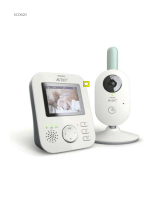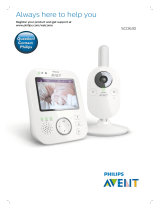
Disclaimer
Please note that you use this baby monitor at your own risk. Koninklijke
Philips N.V. and its subsidiary companies are not responsible for the
operation of this baby monitor or your use of it and therefore do not accept
any liability in connection with your use of this baby monitor.
Danger
-
Never immerse any part of the baby monitor in water or any other liquid.
Do not place the appliance where water or any other liquid can drip or
splash onto it. Never use the baby monitor in moist places or close to
water.
-
Never put any object on top of the baby monitor and do not cover it. Do
not block any ventilation openings. Install according to the
manufacturer’s instructions.
-
Cords present a potential strangulation hazard. Keep cords out of the
reach of children (more than 1 meter/3.5 feet away). Never place the baby
monitor inside the baby’s bed or playpen.
Warning
-
Check if the voltage indicated on the adapter corresponds to the local
mains voltage before you connect the appliance.
-
Do not modify or cut off any part of the adapter and its cord, as this
causes a hazardous situation.
-
Only use the adapter supplied.
-
If the adapter is damaged, always have it replaced with one of the
original type in order to avoid a hazard.
-
This appliance can be used by children aged from 8 years and above and
persons with reduced physical, sensory or mental capabilities or lack of
experience and knowledge if they have been given supervision or
instruction concerning use of the appliance in a safe way and understand
the hazards involved. Children shall not play with the appliance. Cleaning
and user maintenance shall not be made by children without supervision.
-
Protect the mains cord from being walked on or pinched particularly at
plugs, convenience receptacles, and the point where they exit from the
appliance.
-
Make sure that you place the baby monitor in such a way that its cord
does not obstruct a doorway or passage. If you place the baby monitor
on a table or low cabinet, do not let the mains cord hang over the edge
of the table or cabinet. Make sure the cord does not lie on the floor
where it presents a tripping hazard.
-
Keep the packaging materials (plastic bags, cardboard buffers, etc.) out of
the reach of children, as they are not a toy.
-
To prevent electric shock, do not open the housing of the baby unit or
parent unit.
Caution
-
Use the appliance at a temperature between 0°C (32°F) and 40°C (104°F).
-
Do not install the appliance near any heat sources such as radiators, heat
registers, stoves or other apparatus (including amplifiers) that produce
heat.
7
English





























